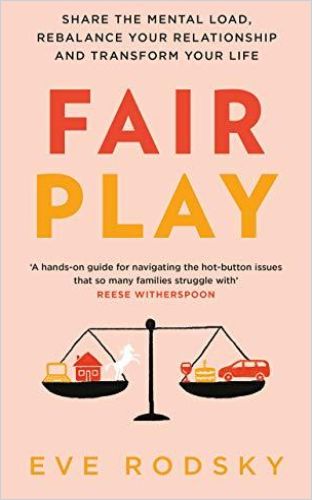Philanthropy Advisory Group co-founder Eve Rodsky offers a comprehensive, blame-free system for equitably allocating domestic work.

Follow the Cards
Harvard-educated attorney Eve Rodsky – co-founder of the Philanthropy Advisory Group – felt all household responsibilities falling on her shoulders after she gave birth to her son. Rodsky was exhausted, overextended and felt her husband, Seth, had abandoned her. This prompted Rodsky to create a system to rebalance the domestic workload. Based on hundreds of interviews with couples, extensive research into domestic inequality and input from experts, Rodsky, with the help of her friends, created Fair Play: a life-management system that provides an equitable approach to sharing domestic responsibilities, and creates more efficiency and harmony within your home.
The Lion’s Share
After giving birth to her son, Rodsky became the “she-fault” parent. She took a three-month maternity leave; her husband returned to work after only one week. Rodsky took care of the baby, laundry, meal prep, cleaning and running errands.
I performed hours upon hours of work that went unnoticed and unacknowledged by my husband – and sometimes, even by me.Eve Rodsky
Rodsky worked from home, while performing all the domestic chores and caring for the baby.
“Invisible Work”
Rodsky and her husband had a second child. She resumed working outside the home but still did two-thirds of the household work. Rodsky realized that “Visibility = Value”; she had to make clear to Seth how much she did.
Fair Play provides you with a new way of thinking about how work can be shared within your family, creating solution-based, sustainable change that you no longer have to think about. Eve Rodsky
Rodsky and her friends made lists of everything they did daily and the time they spent doing those things. After sharing her “Sh*t I Do” list with her husband, Rodsky created a family management system with defined roles, precise expectations and processes to measure accountability. This evolved into the Fair Play system for sharing household work – with four rules and 100 task cards. The system relies on transparency and mutually agreed-upon expectations.
Sh*t I Do
As Rodsky’s Sh*t I Do list grew, she grouped tasks and created sub-tasks. For example, the Pet Care category included finding a vet, scheduling appointments, planning pet care during vacations, and buying food and treats.
Mental freedom, in the form of more room, more space and more time to have singular focus should not be reserved for working men/fathers/husbands.Eve Rodsky
Even when partners helped with tasks, Rodsky and her women friends found they still had to plan, organize and issue instructions; so the burden of their mental to-do lists remained unchanged. In the Fair Play system, whichever spouse takes charge of a task tackles every aspect of that job.
If we want our partners to feel empowered and capable of succeeding, rather than clueless or helpless until directed, we have to ditch the maternal gate keeping control.Eve Rodsky
Rodsky and her husband codified redistributing domestic work with four rules: “All time is created equal. Reclaim your right to be interesting. Start where you are now. Establish your values and standards.”
Time Imbalance
Time is a finite and valuable resource. Society views men’s time as limited and valuable, and women’s time as infinite and expendable. The first Fair Play rule is: All time is created equal.
This ‘time tax,’ where women are burdened with more than our fair share of child care and domestic work, compromises every aspect of our lives – our relationships, career, sense of identity and physical and mental health.Eve Rodsky
There’s no end to parenting, no vacations and no sick leave. Even hiring help means finding, vetting and scheduling child care, dog walkers or cleaners.
Tendencies and Predispositions
The key “game changer” lies in initiating change and enlisting your spouse’s commitment to assessing, rebalancing and rebooting domestic responsibilities. Make a specific request for change and an equal partner and collaborator.
Begin with the “100 Cards of Fair Play.” The five master suits are “Home, Out, Caregiving, Magic and Wild.” The Home category includes “Daily Grind” tasks that must happen at a specific time daily, such as making breakfast or packing school lunches. The Out suit includes kids’ sports and auto maintenance. Caregiving includes pet care, helping with homework and bedtime routines. Magic cards focus on relationship activities such as birthday celebrations. The Wild suit contains unexpected events such as losing a job or moving.
In other words, when both people completely own their sh*t, it’s not only more efficient, but there is far less nagging (huge benefit to husbands) and a significant lift in the mental load (huge benefit to wives).Eve Rodsky
Assuming responsibility for a card means you “conceive, plan and execute” that task. For example, if you’re the grocery shopper, note when the family’s low on ketchup (Conception), add it to the list (Planning) and buy it (Execution). Perform your task without asking for help.
Your Situation
With your partner, discard cards that do not add value to your lives. For example, Rodsky and Seth decided to attend only kids’ birthday parties of family members or close friends. Establish a “Minimum Standard of Care” for each task: Agree, for example, that kitchen garbage should go out every evening.
Establishing a Minimum Standard of Care – where both partners align with a long-term goal like family safety – encourages a long-term commitment rather than long-term resentment.Eve Rodsky
Fair Play divides child care and domestic responsibilities between two people according to their values, strengths, expectations and priorities. Schedule a weekly date to exchange constructive feedback, clarify roles and expectations, and kick-start the following week. Exchange daily grind cards to keep one person from being stuck with a tedious or thankless task. Add short-term rewards such as massages or ice cream nights.
“Unicorn Space”
Time spent on things that make you happy and fulfilled is “Unicorn Space.” Unicorn space enables you to live a full life beyond your family. Utilize unicorn space to set and achieve new milestones, take on new challenges and pursue your passions.
Dream of what you’d like to do or learn. Consider “hand” activities, such as crafting or cooking;“heart” pursuits, such as volunteering or taking part in political activism; and adrenaline-producing activities such as mountain biking. For “head” activities, take a class, meditate or join church activities. Contributing to something greater than yourself is a direct path to well-being and fulfillment. Rodsky urges you to model this behavior for your children.
Your Fair Share
Rodsky writes in a breathless style that will either engage you or make you turn away. She also presents from a certain level of privilege that, at times, seems unconscious. Her system seems best suited for a one-earner household – though she insists it will work for two – in which that one earner earns a lot. Rodsky also narrows her audience with a certain emphasis on the chores implicit in hiring help. But her cards are well-designed, comprehensive and have found a broad audience.
Rodsky’s system is fair, and you can apply it easily. Yet, its primary problem might be that if your partner proves unwilling to codify household responsibilities in a conscious, equitable way, all the cards in the world will make little difference.
Eve Rodsky also wrote Find Your Unicorn Space and The Fair Play Deck.





